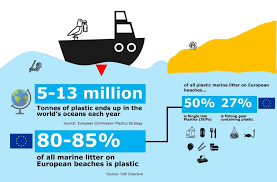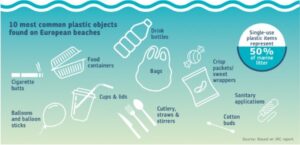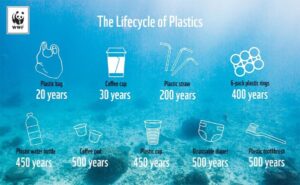Bord Iascaigh Mhara recently organised a webinar to discuss the implications of the EU Single-Use Plastics Directive which comes into being on 3rd July 2021.
The Directive will have implications for anyone manufacturing, supplying or using plastic or composite (including plastic) equipment in the fishing and aquaculture sectors. It has come out of a need to address the issue of plastic waste polluting the marine environment. According to the Directive;
80 to 85 % of marine litter, measured as beach litter counts, is plastic, with single-use plastic items representing 50 % and fishing-related items representing 27 % of the total
As a means of tackling this problem the Single-Use Plastic Directive (SUPD) (EU) 2019/904 is being phased in over the next 3 years with the aim of moving from a linear to a circular business model. That means moving from the practice of using plastic products (like cups, straws etc) and disposing of them to landfill, to a system where recycling of old or ‘retired’ products is built into the intended life cycle of the product. The deadline for the requirements of the Directive to be put into place is December 2024.
The Directive allows for the creation of an Extended Producer Responsibility Scheme (EPR Scheme).
As plastic components of fishing gear have high recycling potential, Member States should, in line with the polluter-pays principle, introduce extended producer responsibility for fishing gear and components of fishing gear containing plastic to ensure separate collection of waste fishing gear and to finance environmentally sound waste management of waste fishing gear, in particular recycling.
A number of similar schemes are already in place for other items such as tyres, batteries and farm plastics. Liam Moloney of the IFFPG who are the body who oversea the EPR Scheme for farm plastics gave a short presentation to the webinar on how the scheme operates within that industry. The Board of this group is made up of farmers, producers, manufacturers and representatives from the IFA. It is proposed that under the legislation a similar body would be created from the relevant groups in the Fishing and Aquaculture Sectors to oversee an EPR Scheme for our Industry.
In 2019 BIM commissioned a report to assess the feasibility of recycling redundant oyster bags in Ireland or abroad. A lot of effort was made by the authors of that report to investigate all possible ways to re-use or recycle the bags and at the time of publishing the results there was no clear path to recycling available. A lot of that was due to lack of volume; there simply were not enough bags to make it economically viable for a commercial entity to be interested in them.
Article 3.4
‘fishing gear’ means any item or piece of equipment that is used in fishing or aquaculture to target, capture or rear marine biological resources or that is floating on the sea surface, and is deployed with the objective of attracting and capturing or of rearing such marine biological resources.
With the remit of this Directive including not just oyster bags but all ‘fishing gear’ we may now be getting to a point where a viable critical mass is achieved and commercial interest is piqued to provide.
So what is the intended purpose of all this additional cost and effort?
The EU’s intention is laudable and one that we naturally endorse:
Member States shall take the necessary measures to achieve an ambitious and sustained reduction in the consumption of the single-use plastic products listed in Part A of the Annex, in line with the overall objectives of the Union’s waste policy, in particular waste prevention, leading to a substantial reversal of increasing consumption trends.
And this will be achieved by recording and reporting annually the amounts of plastic gear that is put onto the market, and retired from use. This data will allow the Member States to set targets for the industry to meet in terms of reduction of usage of plastics. However, it’s a long way between here and there and a lot of work will need to be done to achieve meaningful buy-in from the industry, set up the EPR Scheme and get those recording systems up and running.
We’ll be following the industry response to the Directive closely and will post updates on our blog as developments occur.



